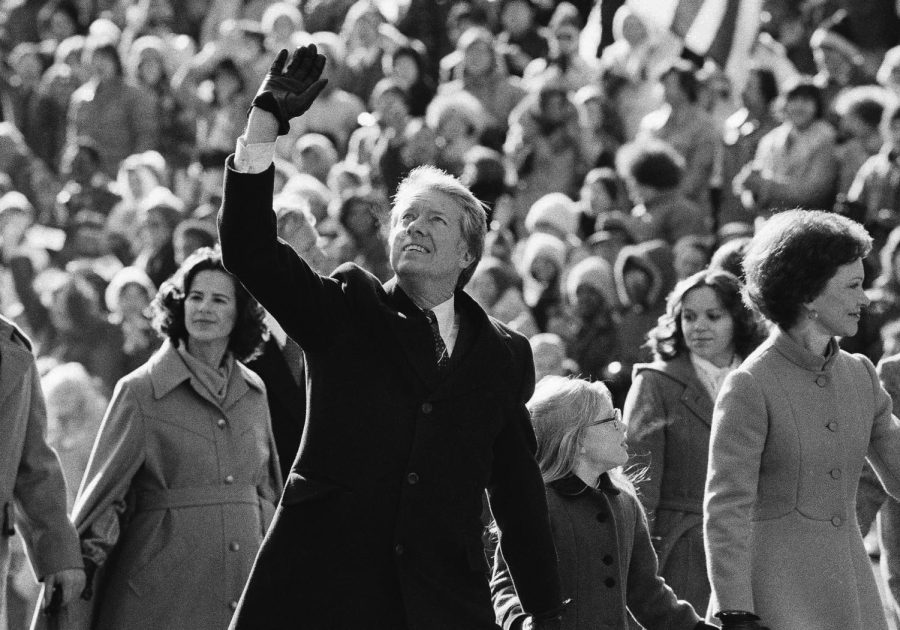Jimmy Carter and the Legacy of the After-Presidency
President Carter waves to crowds along Pennsylvania Avenue following his Inauguration in 1977
In season three, episode 13 of the political drama “The West Wing,” someone tells the fictional President Jed Bartlett, “I think Lincoln did what he thought was right, even though it meant losing half the country. I think you don’t do what you think is right if it means losing Michigan’s electoral votes.”
When looking at today’s media coverage, one could substitute Jimmy Carter for Lincoln and the sentiment would hold true.
On Feb. 18, it was announced that President Carter would begin receiving hospice care. After this announcement, stories of the post-presidency work of President Carter flooded media outlets. At 98 years old, Carter is currently the oldest living president and the president with the longest post-office time. Known for establishing The Carter Center, his legacy rests in the work the foundation has done to establish democracy and eradicate health issues across the globe.
President Carter was always one to stick to his morals. According to his Vice President, Walter Mondale, “The worst thing you could say to Carter if you wanted him to do something was that it was politically the best thing to do.”
Similar to Lincoln’s legacy, President Carter made decisions that matched his policy goals instead of boosting his polling numbers. Carter waged no war during his presidency — instead, he invited the heads of state of Israel and Egypt to Camp David where the Camp David Accords were signed that brought an end to their countries’ feud. On a smaller scale, Carter installed solar panels in the White House and wore sweaters instead of turning the heat up while the U.S. went through an energy crisis.
When he lost the presidential office to Ronald Regan in 1980, Carter gave a speech declaring that there would be “a very fine transition period.” He left a telegram to Regan which read, “It’s now apparent that the American people have chosen you as the next President. I congratulate you and pledge to you our fullest support and cooperation in bringing about an orderly transition of government in the weeks ahead. My best wishes are with you and your family as you undertake the responsibilities that lie before you.”
While he may have lost the presidency, President Carter did not let it stain his legacy as a moment of animosity. He also refrained from giving media comments on Regan’s presidency in the beginning as well. Either in office or losing it, President Carter chose the moral high ground.
No matter what guide Carter used during his presidency, or whether one agrees with his policy or not, what he has accomplished since then has had a tremendous effect on global well-being. According to the New York Times, former First Lady Rosalynn Carter once recalled her husband sitting up in bed one night after losing the office and saying, “I know what we can do. We can develop a place to help people who want to resolve disputes.”
This led to the creation of The Carter Center, dedicated to ending political and health crises across the globe.
President Carter’s mission to create a more peaceful world persisted for the 40-plus years since he left office. Since 1984, President and Mrs. Carter have worked with Habitat for Humanity in over 14 countries, including the United States, to build and repair 4,390 homes. In 2002, President Carter was awarded the Nobel Peace Prize for “his decades of untiring effort to find peaceful solutions to international conflicts, to advance democracy and human rights, and to promote economic and social development.” He is the only U.S. president to have won the prize after leaving office. While this could be seen as a crowning achievement, Carter did not let his work stop there. Through the work of the Carter Center, the former president worked to find cures for diseases with no vaccines, such as guinea worm.
In 2015, President Carter said, “I would like to see Guinea worm completely eradicated before I die.”
This goal is almost achieved: through the Center’s work on preventative education and medical care, Guinea worm cases decreased from 892,055 in 1989 to only thirteen in 2022.
President Carter’s biography, written by Kai Bird, is titled The Outlier: The Unfinished Presidency of Jimmy Carter. What better way to describe President Carter’s legacy than “unfinished?” No matter the accolades bestowed upon him or the title he held, President Carter never deterred from his goals of making this world a safer place, both in the United States and abroad. The articles published in the past few weeks have paid more heed to the work President Carter did outside of office rather than in it, speaking to the impact of his legacy. In a time where so much of politics happens through online discourse, President Carter is an example of the legacy one creates when one turns their words into actions for the betterment of society. Both in office and out of it, President Carter was guided not by the promise of electoral votes or political clout, but by the idea of creating a more peaceful, healthier world. People across the globe will remember him for generations.

Emma McCartan is a sophomore from Guilford, CT majoring in international relations with a minor in Middle Eastern and Islamic studies. She has previously...









